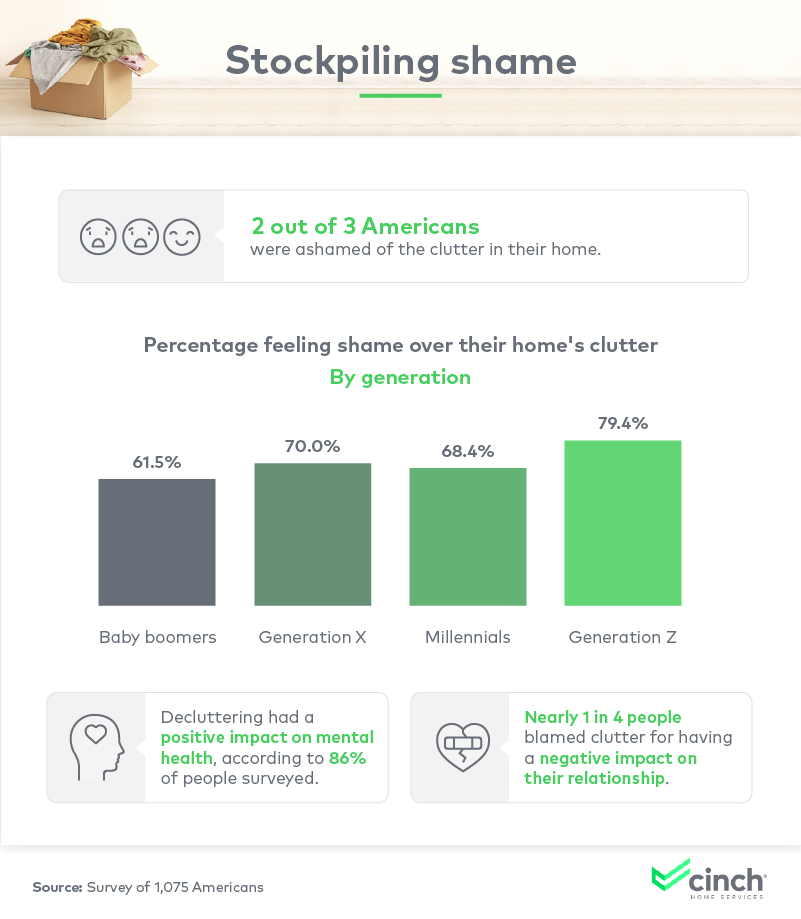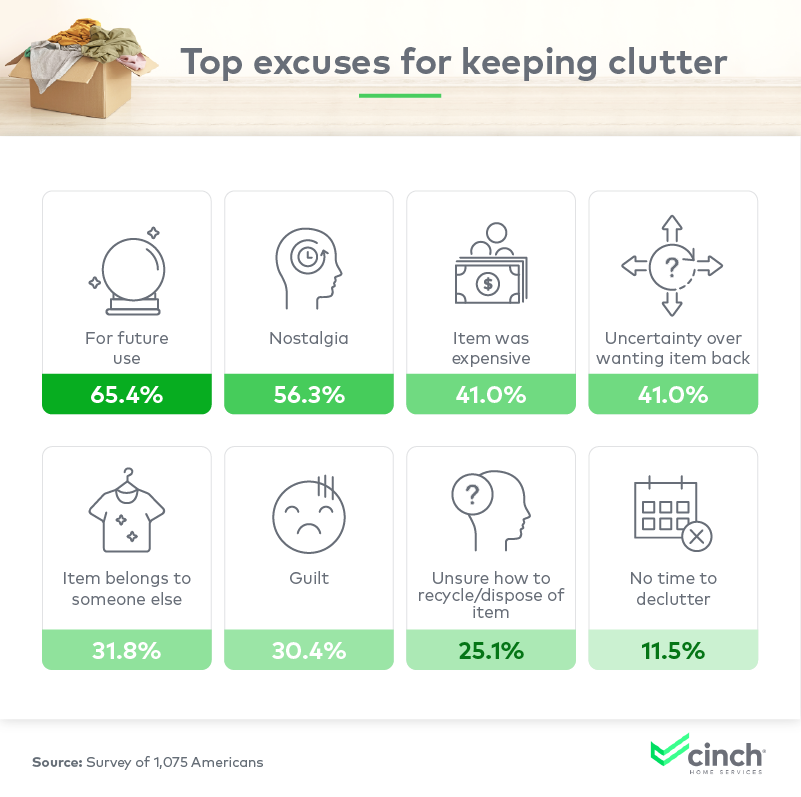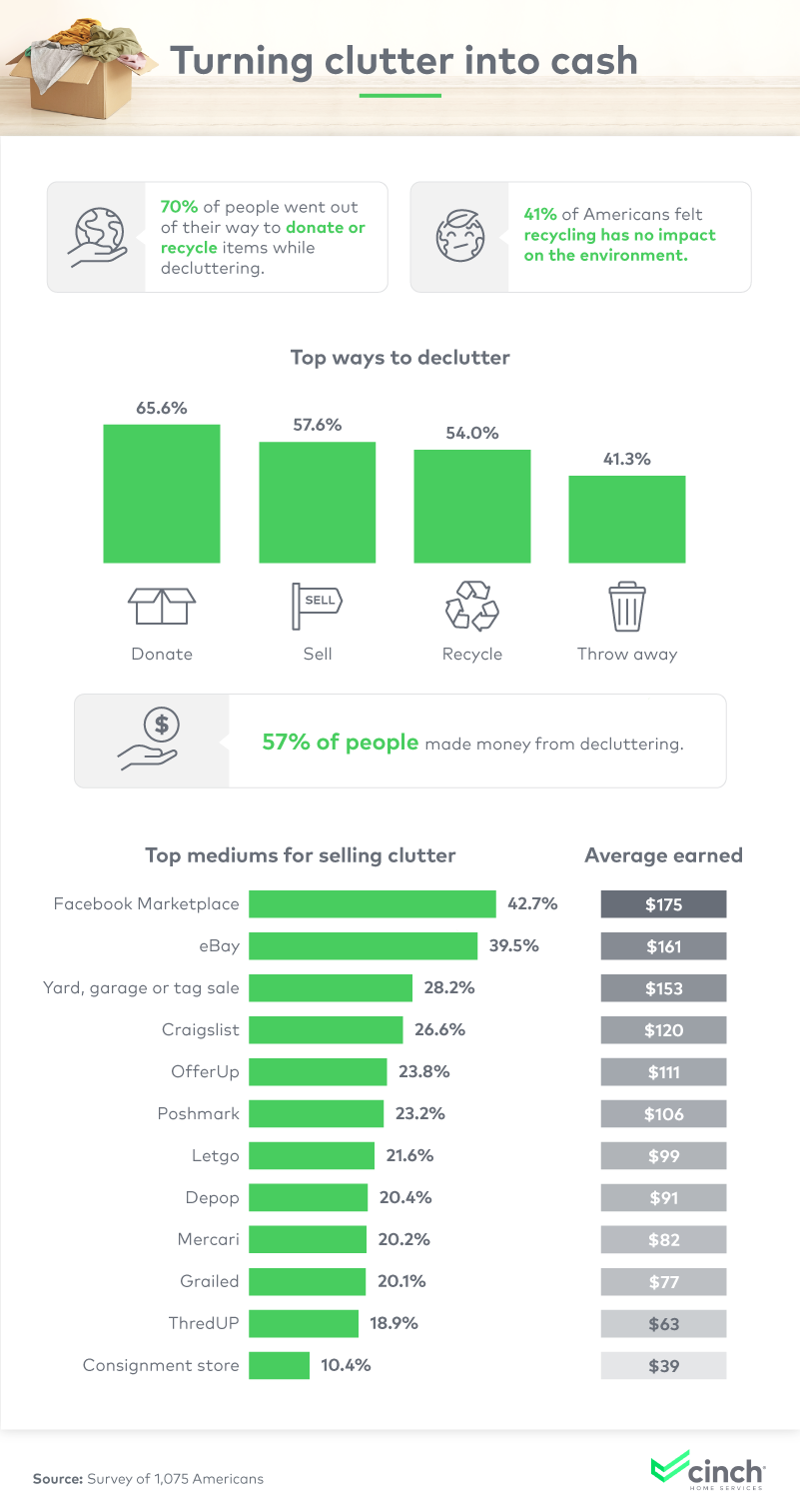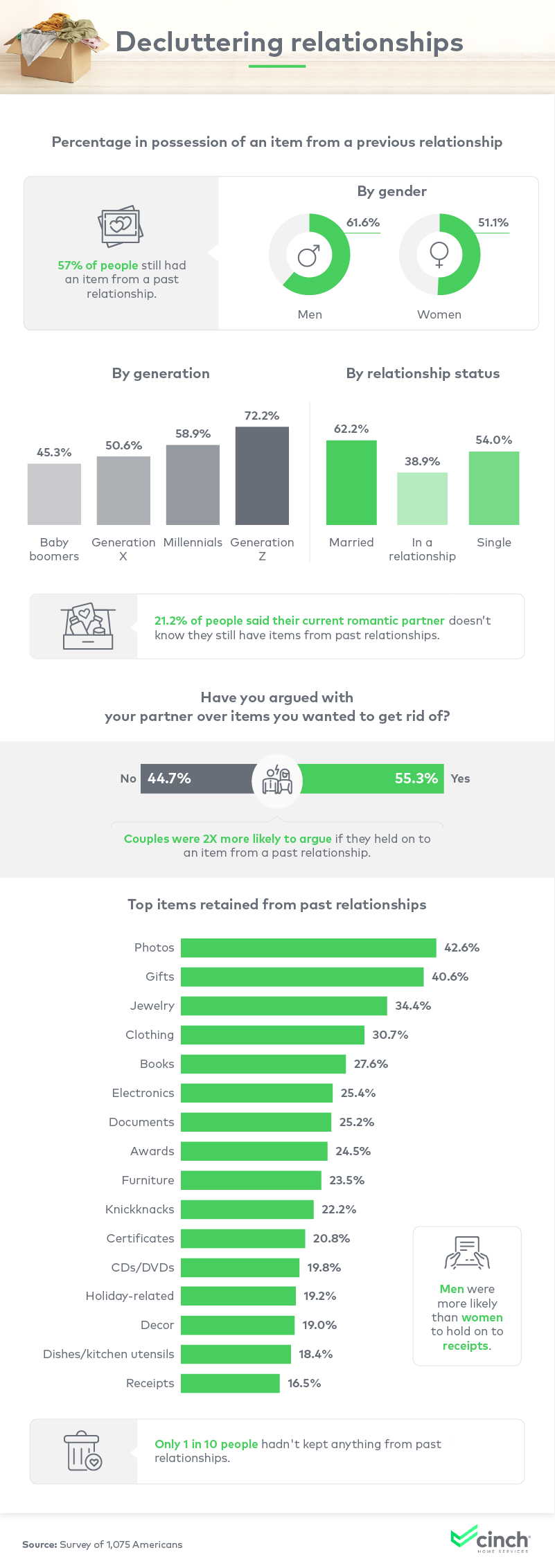2 out of 3 Americans are ashamed of the clutter in their home [survey]

Key takeaways:
- Two out of 3 people feel shame due to the clutter in their home
- 57% of people still have an item from a past relationship
- More than half of people report making money from decluttering
Clutter is a detriment to your physical and mental well-being. Clogging your space with unnecessary belongings can distract you from your most important goals and physically prevent you from enjoying your space to its fullest. There's also a real financial loss associated with excessive consumption and a refusal to divest.
So why is clutter still so common, especially in the U.S.? To answer this highly important question, the team at Cinch Home Services surveyed more than 1,000 U.S. residents with probing questions about their reasons for holding on to too many things. Americans shared their top excuses, anxieties and the impacts of clutter on their life. To feel simultaneously inspired and less alone in your journey to declutter, keep reading.
Extent of the clutter
The first step in examining the impact of clutter in the average American home was to ask respondents how their existing clutter was making them feel. We asked if they felt shame around their clutter, and how they estimated its presence was influencing both their relationships and their overall mental health.

Clutter noticeably induced feelings of shame for two-thirds of Americans. Shame is a critical contributing factor to feelings of depression, anxiety and low self-esteem, yet it evidently has at least one incredibly fixable and tangible cause. Americans were well aware of this correlation in their homes. Gen Z currently struggles with this clutter-induced shame more than any other generation, perhaps due to their position as the incoming largest consumer base and the one that receives the most targeted marketing efforts.
Not only did Americans notice shame, but they also often noticed clutter having a negative impact on their romantic relationships, which we further dissect later in this study. Fortunately, the solutions seem straightforward: When people did take the time to declutter, they felt a positive impact on their mental health 86% of the time.
Reasons for retaining the mess
The acute awareness of clutter's negative impact immediately begged the question, why keep it around? This next piece of our study looks at the top excuses respondents had for maintaining clutter in their surroundings.

Evidently, the anxiety caused by clutter was not as strong as the fear of potentially needing an item again at some point. Sixty-five percent cited maybe needing an object in the future as their top reason for not decluttering. The world's premier decluttering expert, Marie Kondo, insists that this is not a particularly compelling reason to hold on to something that does not bring you joy. One key question to ask yourself in this circumstance is whether you want this item to be a part of your future, as opposed to an obligatory part of your ideal self.
Sentimentality represented another common barrier to decluttering: 56.3% said certain items bring back memories. Kondo again offers her expertise here and shares that decluttering should be a one-time—yet highly intensive—process, where you save the sentimental items as your very last category. By the time you reach this piece of the process, you will have gained enough experience, practice and rewards throughout decluttering that you won't struggle as much with difficult, sentimental choices. Beginning with this category is a recipe for disaster, as she explains. Only 11.5% of respondents claimed to lack the time to declutter, which suggests people underestimate how much time they should dedicate to this one-and-done process.
Monetary rewards of clutter removal
Not only are people sitting on piles of shame and stress, but they're also sitting on potential gold mines. Some retained items can generate monetary rewards, while the removal of clutter may provide financial success in other less tangible ways. Here, we ask respondents to share whether they've been able to make money from decluttering and just how much.

Selling was often a better option than recycling: 41% of Americans believed recycling doesn't even make an impact on the environment. Many experts back this claim, stating that most recycling is simply "wishcycling" and can actually do more harm than good. The true solution is to generate less waste in the first place, and when you do have items you no longer want, attempt to ensure they go to someone who wants the item, such as through selling or donation. The vast majority of Americans (70%) reported doing as much.
Most Americans also reported having already made money from decluttering. Most often, they turned to the internet or, more specifically, Facebook Marketplace (42.7%) and eBay (39.5%). People had already been able to pocket an average of $175 and $120 on these platforms, respectively. Keep in mind that this earned money is in addition to the noted mental health and spatial benefits. Hopefully, it also prevents landfill waste and future habits of overconsumption in respondents' homes.
Holding on to past relationships
As we mentioned before, sentimental items are often the most difficult to remove from the home. This sentimentality frequently stems from past romantic relationships. Our study concludes with a look into how holding on to these types of items can impact current and future relationships.

Holding on to pieces of a past relationship, even when well into a new one, is incredibly common in the U.S. In fact, only 1 in 10 respondents said they did not keep anything from a past relationship. Unfortunately, this did not bode well for the present moment. For many, keeping these physical items represented holding on to a secret and dishonesty: Nearly a quarter said their current romantic partner had no idea. Moreover, these couples were 100% more likely to get into arguments specifically because of those items.
Most often, these triggering items from past relationships were photos (42.6%), gifts (40.6%) and jewelry (34.4%). While there's a small likelihood of being able to make money off of photos, jewelry and gifts may be the perfect items to sell, especially if they're causing tension in your current relationship. Ironically, many of the fights began over items that the person wanted to get rid of anyway. If you needed a data-based sign to begin decluttering these items, this is it.
Decluttering for your dreams
The evidence has reminded us of several important and potentially life-altering reasons to declutter. Respondents who had clutter in their home admitted to feeling shame specifically because of the clutter and even reported related negative impacts on their relationship, from keeping secrets to repeated arguments. When they did remove clutter, they noticed mental health as well as monetary benefits.
In spite of these remarkable upsides for creating space, the clutter problem is getting worse and worse as generations get younger. This mirrors the larger problem of overconsumption, pollution and downgrading mental health across the world. Perhaps this evidence and commentary will be just the spark you needed to begin the decluttering process in your own home, your own life and the world at large.
Methodology and limitations
This study uses data from a survey of 1,075 Americans. Survey respondents were gathered through the Amazon Mechanical Turk survey platform, where they were presented with a series of questions including attention-check and disqualification questions. Participants incorrectly answering any attention-check question had their answers disqualified. 48.7% of respondents were men, while 50.6% were women. Less than 1% of respondents identified as nonbinary or other. Respondents ranged in age from 18 to 77 years old with an average age of 39. Gen Zers accounted for 16.4% of respondents, millennials for 38.4%, Gen Xers for 28.7% and baby boomers for 16.5%. This study has a 3% margin of error on a 95% confidence interval.
Please note that survey responses are self-reported and are subject to issues, such as exaggeration, recency bias and telescoping.
Fair use statement
Decluttering is clearly a much-needed practice in the U.S. If you think someone in your audience would benefit from the findings of this study, you are welcome to share it with them. Just be sure your purposes are noncommercial and that you link back to this page when doing so.
